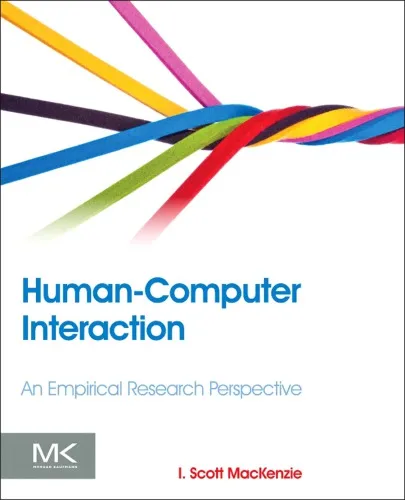Human-Computer Interaction: An Empirical Research Perspective
4.5
Reviews from our users

You Can Ask your questions from this book's AI after Login
Each download or ask from book AI costs 2 points. To earn more free points, please visit the Points Guide Page and complete some valuable actions.Related Refrences:
Introduction to 'Human-Computer Interaction: An Empirical Research Perspective'
The book "Human-Computer Interaction: An Empirical Research Perspective" offers a comprehensive exploration into the dynamic and fascinating world of HCI. Authored by I. Scott MacKenzie, this book delves into the empirical research methodologies and the foundational principles that drive innovative interactions between humans and computers. Designed both for students and professionals in the field, MacKenzie's work provides a robust framework for understanding and applying empirical research methods to enhance user experiences with technology.
Detailed Summary of the Book
The book systematically introduces the principles and practices fundamental to the understanding of Human-Computer Interaction (HCI). It begins by discussing the importance of HCI and the evolution of research within the field, setting the stage for a deeper exploration of empirical research methods. MacKenzie emphasizes on the scientific approach towards understanding human interaction with computers, providing detailed insights into user behavior, cognitive processes, and usability testing.
Chapters are structured to guide readers through various methodologies, including qualitative and quantitative research techniques, statistical analysis, user-centered design, and evaluation methods. Each section is intertwined with real-world examples and case studies, offering practical applications of theoretical concepts. The book also addresses the significance of designing for diverse user needs, considering cultural, cognitive, and emotional factors that influence interaction with technology.
Key Takeaways
- Comprehensive understanding of empirical research methods in HCI.
- Insight into the cognitive, social, and ergonomic aspects of user interaction.
- Practical guidance on conducting usability studies and interpreting data.
- Strategies for designing user-centered interfaces that enhance user satisfaction and performance.
- Applications of HCI principles in emerging technologies like virtual reality and artificial intelligence.
Famous Quotes from the Book
"To design an interface means to manage the complexity not by reducing it, but by mastering it."
"Empirical research in HCI is not just about using scientific methods to understand users, but also about integrating these insights into the design process."
"A user-centered approach is not an option but a necessity for creating impactful and meaningful technology experiences."
Why This Book Matters
The significance of "Human-Computer Interaction: An Empirical Research Perspective" lies in its meticulous approach to coupling scientific inquiry with practical application. In an era where technology is pervasive and ever-evolving, understanding the nuances of how users interact with devices and systems is paramount. This book serves as a crucial resource for anyone involved in the design and development of user interfaces and technology solutions.
By bridging the gap between theory and practice, MacKenzie equips readers with the tools needed to conduct impactful research and translate findings into actionable design enhancements. This, in turn, drives the creation of more intuitive, efficient, and user-friendly technological products. For educators, students, and practitioners alike, the book stands as an indispensable text that informs and inspires innovation in HCI.
Free Direct Download
You Can Download this book after Login
Accessing books through legal platforms and public libraries not only supports the rights of authors and publishers but also contributes to the sustainability of reading culture. Before downloading, please take a moment to consider these options.
Find this book on other platforms:
WorldCat helps you find books in libraries worldwide.
See ratings, reviews, and discussions on Goodreads.
Find and buy rare or used books on AbeBooks.
1448
بازدید4.5
امتیاز50
نظر98%
رضایتReviews:
4.5
Based on 0 users review
"کیفیت چاپ عالی بود، خیلی راضیام"
Questions & Answers
Ask questions about this book or help others by answering
No questions yet. Be the first to ask!






